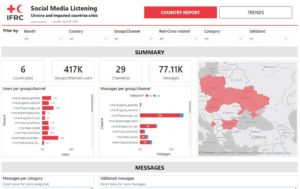
Guillem Arderius
Description
With the Social Media Listening tool (SML), it is possible to scan posts and messages on social media and instant messaging applications (such as Telegram or X). The messages are scraped, translated, coded and analyzed to provide a qualitative and quantitative summary of the most discussed topics by people affected. These insights provide an unbiased understanding of their needs, fears, feedback, sentiments, and experience.
Combining quantitative and qualitative data and identifying key insights and trends from these messages helps mitigate risks and helps the IFRC and National Societies define, implement and improve (CEA) activities, programs and information campaigns.
Context
Community Engagement & Accountability (CEA) is a way of working that recognizes and values all community members as equal partners whose diverse needs, priorities and preferences guide everything the Red Cross Red Crescent Movement does. This is achieved by integrating meaningful community participation, open and honest communication and mechanisms to listen to and act on feedback within programmes or operations.
The Social Media Listening tool allows for continuous feedback collection that is unbiased and can be used when it’s challenging to access or communicate with people affected. In June 2022, 510 started providing the SML service with more than 20 Telegram groups in Ukraine and neighbouring countries (Poland, Slovakia, Romania – Moldova and Bulgaria were added in February 2023 and Hungary in august 2023). Every two weeks, a data model developed by 510 Data Scientists, scrapes, translates and classifies thousands of messages posted in these Telegram groups. A large sample of these messages is then read by 510 CEA officers, who code and analyze them into actionable information that includes Frequently Asked Questions, needs, and more general insights.
With this way of working, thousands of messages are presented in a Power BI dashboard, a 1-page cross-regional narrative report and a 2-page country narrative report which facilitates the regional and national CEA teams to advise on improvements of activities, programs, and information campaigns that support people affected.
Technical details & Operations
To start, the program asks the National Society to select and grant the relevant Telegram groups. In the groups, they introduce ourselves and explain why they have been added. Then, the model scrapes all the messages that were shared in the last month. As part of the scraping, the model also translates the messages and ensures all personal information (such as someone’s name) is taken out. This data can then be accessed in Argilla. This is the platform that the CEA focal points use to do the coding of the messages. In Argilla, the coding can happen both automatically and manually. In their work, they use a combination and always make sure that they manually validate a sample of the messages that were coded automatically. After the messages are coded, they are analyzed and updated in the Power BI dashboard. They then create an overview of the most Frequently Asked Questions that people affected have, and they update the regional and country level reports. Once a month, they present the main findings to the National Societies and the IFRC.
Deployment & Impact
With SML, the point is to be able to help people affected better by targeting their real needs.
It allows National Societies to increase their understanding of the priorities of people affected and to adjust the response accordingly.
50+ Telegram groups
1.5M+ messages scraped
150K+ messages read (and manually coded)
90+ reports (country & regional level)
30+ presentations (with the NS and IFRC on the main insights)
“Social Media Listening is the key that unlocks the doors to empathy, information and swift response, reminding us that, even in the virtual space, we can make a tangible difference in the lives of those facing adversity.”
Diana Medina, Regional Community Engagement and Accountability Coordinator for Europe and Central Asia at IFRC






